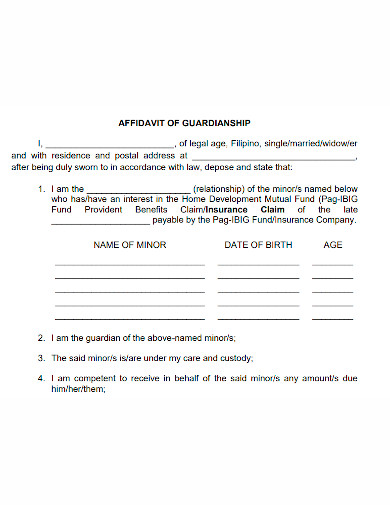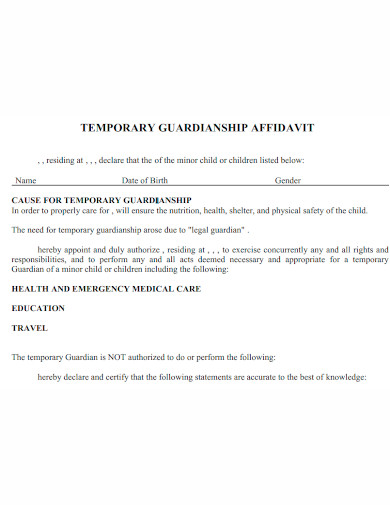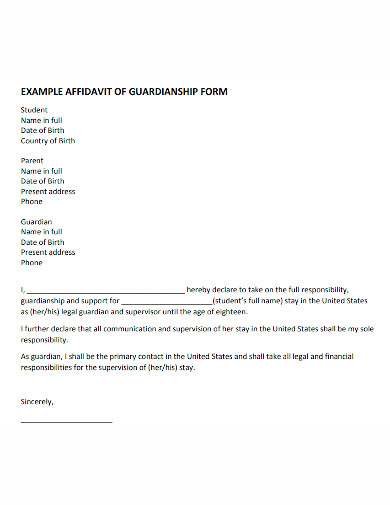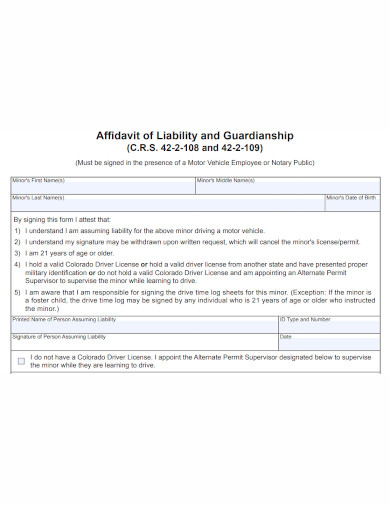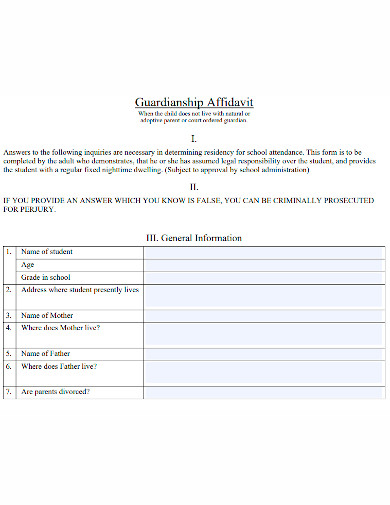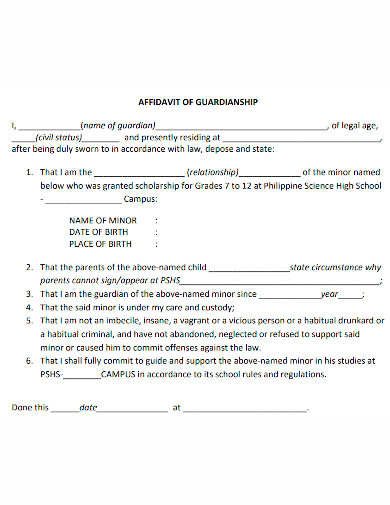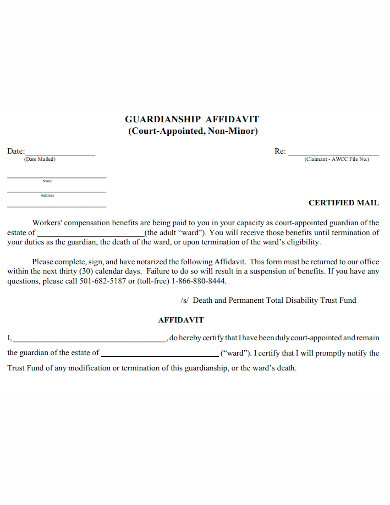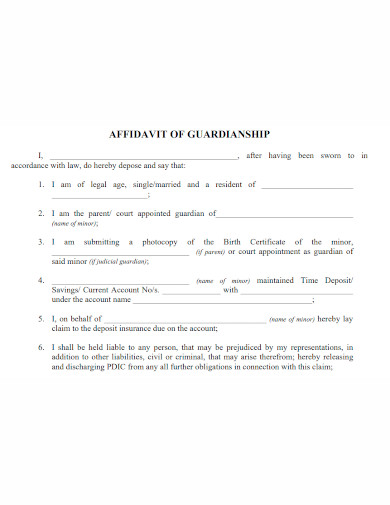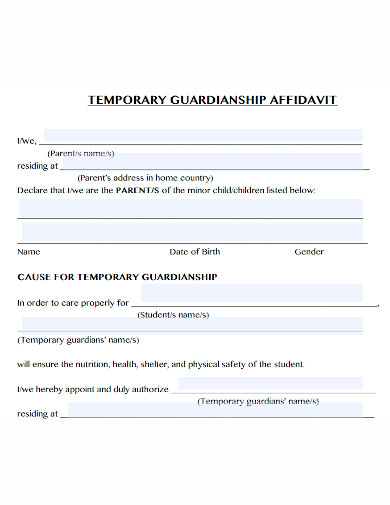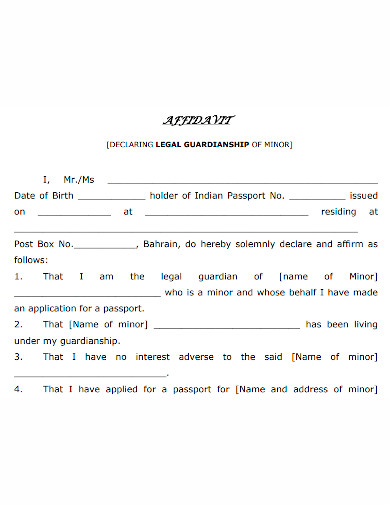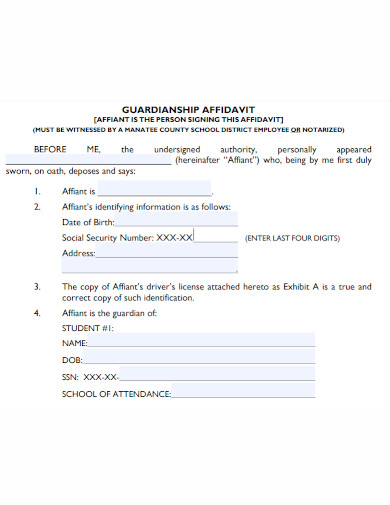Guardianship is a legal process used to protect individuals who are unable to care for their own well-being due to infancy, incapacity or disability. A court will appoint a legal guardian to care for an individual, known as a ward, who is in need of special protection. Legal guardians have the legal authority to make decisions for their ward and represent their ward’s personal and financial interests. Legal guardianships can be created for both children and minors. They also can be established for an adult under certain circumstances, such as when they are either mentally or physically incompetent, or if they become incapacitated for some other reason.
10+ Affidavit of Guardianship Samples
1. Affidavit of Guardianship Sample
2. Affidavit of Temporary Guardianship
3. Affidavit of Guardianship Form
4. Affidavit of Guardianship and Liability
5. Affidavit of Guardianship for School
6. Standard Affidavit of Guardianship
7. Non Minor Affidavit of Guardianship
8. Affidavit of Guardianship Format
9. Professional Affidavit of Guardianship
10. Affidavit of Legal Guardianship
11. General Affidavit of Guardianship
What is a Guardianship Letter?
A guardianship letter is a type of legal document that allows a person to hand over their guardianship rights to a different party. In most cases, this occurs when the parent of an underage child needs to transfer guardianship of the child temporarily to another person, resulting in a temporary guardianship. This might be necessary for a variety of reasons, such as the following:
- If the original parent or guardian will be physically absent for a short period of time, like for instance if the parent or guardian is going on a vacation or taking a business trip;
- When the original guardian has become temporarily incapacitated or is no longer able to care for the ward for some reason; and
- If the guardian is in jail or in a similar unreachable situation where they will not be able to care for the child.
Although guardianship letters generally need to be approved by a court, guardianship arrangements that are more permanent in nature absolutely require additional court intervention and court approval will be necessary for such scenarios.
Details to Include in a Guardianship Letter
What Should be Included in a Guardianship Letter?
It is very important that the guardianship letter be carefully drafted, with much attention being paid to the terms and details of the arrangement. A well-written guardianship letter should include critical information, such as:
- The names and contact information of all the parties involved, which typically includes the ward, the prior guardian, and the new guardian or guardians;
- Trigger dates, such as when the new guardianship arrangement should begin and when the arrangement should be terminated;
- Any supplemental conditions that should be followed in regard to ending the parties’ guardianship arrangement;
- The range or scope of the duties, rights, and authority that the guardian is permitted to exercise;
- If there are any special instructions regarding the well-being of the ward, such as medical care, dietary restrictions or guidelines, and other similar issues; and
- Whether or not the guardianship rights can be further transferred to another party.
Lastly, in order for the guardianship letter to be considered as legally enforceable, it must be notarized or approved by a representative who has court authority.
FAQs
What are the different types of guardianship?
- Guardianship of a Minor: Courts may appoint an adult guardian to care for a minor, who is not the child of the adult. Courts assign guardianships in a number of situations, including when parents have abandoned a minor, when a minor’s parents have died, or when a minor’s parents are incapable of providing proper care for the minor. A legal guardian may be a friend, family member, or other person the court feels will act in the minor’s best interest. As the minor’s legal guardian, an adult may be granted physical custody of the minor, or they may act as a financial guardian who exercises control over the minor’s property.
Guardianship of an Elderly or Incapacitated Individual: Courts appoint guardians, or conservators, to protect the interests of elderly or incapacitated individuals. Because the creation of a guardianship may deprive an individual of some personal rights, certain steps must be taken before a guardian is appointed. An individual has a right to notice and representation by counsel before a guardianship proceeding. During the proceeding, the individual has the right to attend, confront witnesses and present evidence. If the court appoints a guardian, the guardian is encouraged to respect the ward’s wishes and give the ward as much autonomy as possible.
How can an individual avoid a dispute over a guardianship letter?
One of the more common types of disputes that occurs with guardianship letters has to do with the issue of the scope of a guardian’s authority. These instructions should be clearly defined in the letter. For instance, the document should indicate details, such as whether or not the guardian can make medical decisions on behalf of the ward. Additionally, all details should be worked out between the parties prior to signing it since violations of the letter can lead to legal action or a lawsuit. This is especially true when the violation has caused damages to the ward or to a previous guardian. Finally, disputes over a guardianship letter can be avoided by acting cautiously and thoughtfully throughout the drafting and editing process. The more details that are included in the letter, the less likely it will be that a misrepresentation or dispute will arise in the future. This is where hiring a lawyer can come in handy for a party to the guardianship letter.
Guardianship letters often contain a large amount of detailed information. You may want to consider hiring a guardianship lawyer if you need assistance with creating a guardianship letter or if you have any further questions about them. An experienced guardianship lawyer will be able to help you draft, edit, review, and submit the letter to the court for approval. A lawyer can also represent you in court during any related meetings or hearings if a conflict or dispute arises over a guardianship issue.
Related Posts
FREE 10+ Affidavit Of Identity Theft Samples
FREE 10+ Affidavit Surviving Spouse Samples
FREE 9+ Sample Affidavit
FREE 9+ Affidavit Samples
FREE 8+ Affidavit Death of Trustee Samples
FREE 8+ Sample Affidavit Forms
FREE 6+ Letter of Support for Immigration
FREE 42 Sample Service Forms
FREE 19+ Sworn Statement Samples
FREE 11+ Child Support Termination Samples
FREE 10+ Car Receipt Samples
FREE 9+ Non-Receipt Samples
FREE 8+ Sample Gun Bill of Sale Templates
FREE 7+ Sample Divorce Forms
FREE 6+ Sample Stock Certificate Templates

